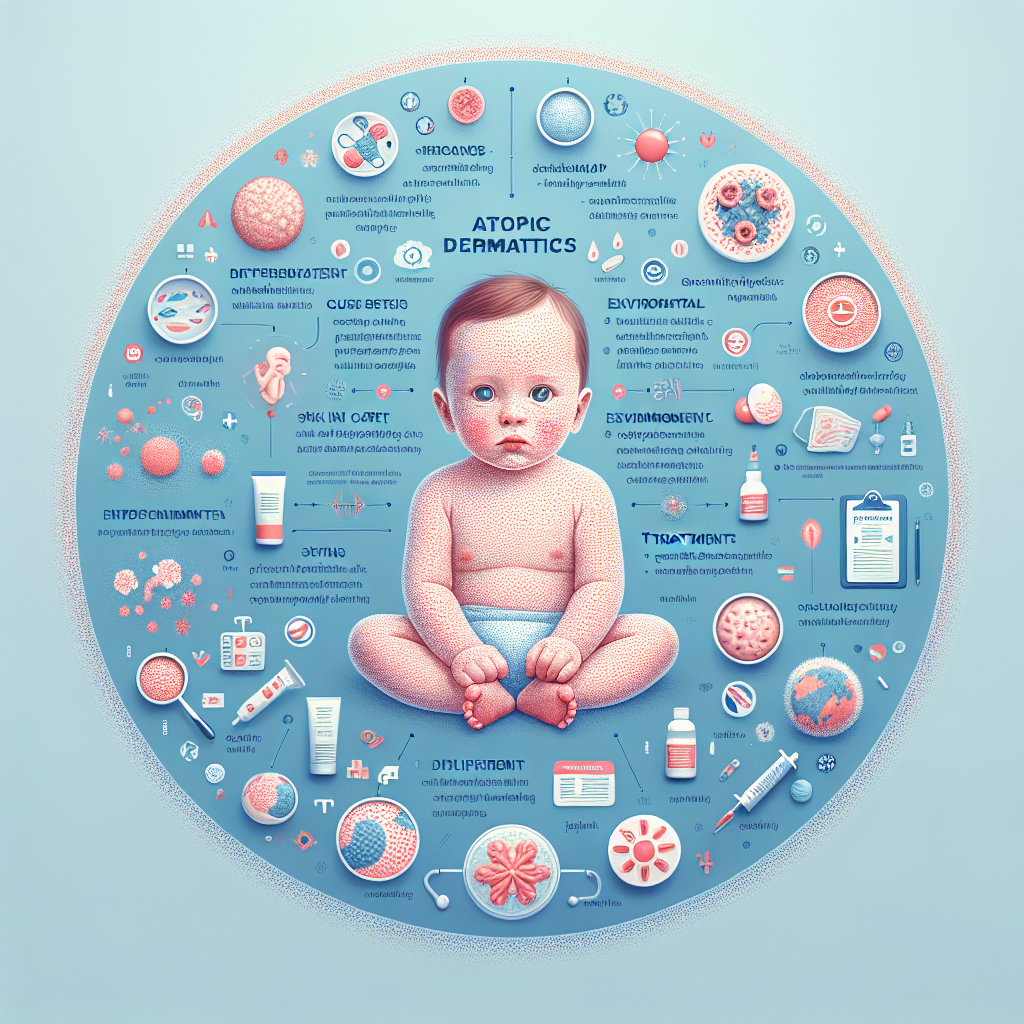Atopic Dermatitis in Babies: Causes and Treatment
Introduction
Atopic dermatitis in babies is a skin problem that worries many parents. This comprehensive guide will provide essential information on the causes and treatments of this condition, helping you better understand how to care for your little one.
Causes of Atopic Dermatitis
Genetic factors
Atopic dermatitis is often related to family history. If one or both parents suffer from asthma, hay fever or eczema, the risk of the baby developing atopic dermatitis increases considerably. It is important to identify these patterns in the family to be more vigilant in observing the first symptoms.
Environmental factors
Climate change, pollution and environmental allergens can trigger or worsen the symptoms of atopic dermatitis. In addition, exposure to irritants such as soaps and strong detergents can have a negative effect on babies' sensitive skin.
Breastfeeding and Nutrition
There is debate regarding the impact of breastfeeding in the development of atopic dermatitis. Although breastfeeding does not prevent eczema, it can improve symptoms. In addition, the varied and gradual introduction of foods can help identify possible food allergies that contribute to the incidence of dermatitis.
Treatment of Atopic Dermatitis
Skin care
An essential step in the management of atopic dermatitis is to keep the skin well hydrated. Using emollients and moisturizers without fragrance or dyes is vital.
Drugs
For more severe cases, topical corticosteroids or calcineurin inhibitors may be prescribed by your pediatrician or dermatologist to reduce inflammation and itching. It is important to use these products under the guidance of a specialist.
Alternative Therapies
For parents who prefer more natural methods, options include oatmeal baths, herbal creams, and acupuncture. However, the effectiveness of these treatments varies, and consulting a doctor is always recommended.
Preventing Flare-Ups
Avoiding Triggers
Identifying and avoiding triggers is crucial. This may include limiting long baths and contact with irritants, as well as maintaining good humidity in the room.
Skin Friendly Clothes and Products
Using cotton clothes that allow the skin to breathe and gentle skin care products without synthetic fragrances and preservatives can really help.
Child Development and Atopic Dermatitis
Motor Development
Although there is no clear direct link between dermatitis and motor development, the discomfort caused by eczema can influence sleep quality and general well-being, indirectly affecting a child's energy levels and exploration.
Language development
Atopic dermatitis does not affect language development directly. However, if sleep is disrupted, it can impact a child's concentration and social interactions, which are essential for language acquisition.
The Role of Diet in the Management of Atopic Dermatitis
A balanced diet rich in essential nutrients can have beneficial effects on skin health. Omega-3 fatty acids, for example, are known for their anti-inflammatory properties and can help relieve symptoms.
Food Allergies
Monitoring and testing for food allergies can help control atopic dermatitis, and parents should work with an allergy specialist to formulate the best dietary strategy for their child.
The Emotional and Social Impact of Atopic Dermatitis
Atopic dermatitis can have a profound impact on self-esteem and quality of life for both children and parents. Creating an environment of support and understanding in the family is just as important as medical treatment.
The Role of the Immune System
Because atopic dermatitis is often associated with an overactive immune response, supporting the immune system through diet and a healthy lifestyle is essential. Vaccinations must be carried out according to medical recommendations.
Conclusion
Atopic dermatitis in babies is not only a treatable condition, but with the right care, it can also be effectively managed. Information, prevention and a solid partnership with medical specialists are key to ensuring an optimal quality of life for your little one. We hope this article will help you confidently navigate the challenges of atopic dermatitis and give your child the best conditions for healthy development. We encourage you to visit our store for baby sensitive skin care products and subscribe to our newsletter for more helpful tips and information.














































































































































